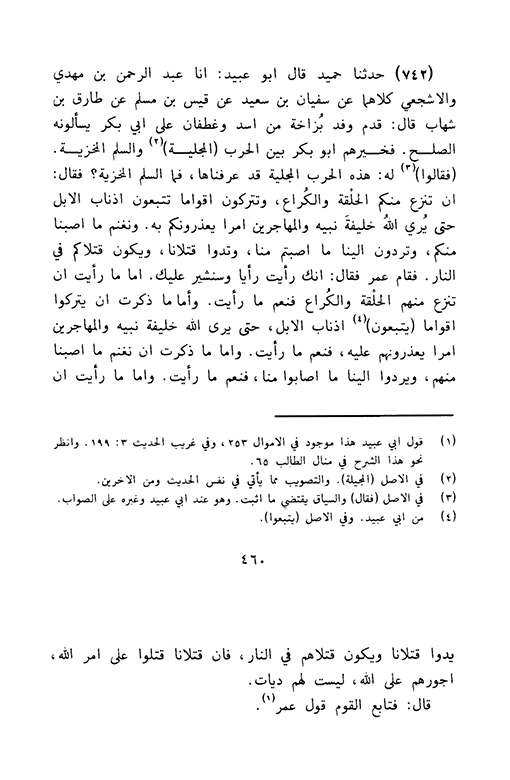This took a lot of research and reading about the incidents you mentioned, but it is very difficult to know exactly which part of an event you are referring to with only the information you have provided. I could not find any of the events you are referring to in the manner you mentioned in books that are accepted by Muslims as references.
I will give an example to demonstrate what I mean: You mentioned the amnesty at the end of the battle of Buzakha (Arabic: بزاخة), so this was somewhat easier to find as you are referring to what happened at the end of this battle. In Sahih Al-Bukhari, one of the most trusted references for Muslims:
حَدَّثَنَا مُسَدَّدٌ، حَدَّثَنَا يَحْيَى، عَنْ سُفْيَانَ، حَدَّثَنِي
قَيْسُ بْنُ مُسْلِمٍ، عَنْ طَارِقِ بْنِ شِهَابٍ، عَنْ أَبِي بَكْرٍ ـ
رضى الله عنه ـ قَالَ لِوَفْدِ بُزَاخَةَ تَتْبَعُونَ أَذْنَابَ الإِبِلِ
حَتَّى يُرِيَ اللَّهُ خَلِيفَةَ نَبِيِّهِ صلى الله عليه وسلم
وَالْمُهَاجِرِينَ أَمْرًا يَعْذِرُونَكُمْ بِهِ.
Narrated Tariq bin Shihab: Abu Bakr said to the delegate of Buzakha.
"Follow the tails of the camels till Allah shows the Caliph
(successor) of His Prophet and Al-Muhajirin (emigrants) something
because of which you may excuse yourselves."
— Sahih Al-Bukhari 93/81
The story behind this can be found in more details in other books, e.g., Al-Musannaf by Ibn Abi Shaybah (Arabic: المصنف لابن أبي شيبة), Al-Sunan Al-Kubra by Al-Bayhaqi (Arabic: السنن الكبرى للبيهقي), I'laam Al-Muwaqqi'in 'An Rabb Al-'Alamin by Ibn Qayyim Al-Jawziyya (Arabic: إعلام الموقعين عن رب العالمين), and others. In summary, I am quoting from Al-Amwal by Ibn Zangawaih (Arabic: الأموال لابن زنجويه):
قدم وفد بزاخة من أسد وغطفان على أبي بكر يسألونه الصلح، فخيرهم أبو بكر
بين الحرب المجلية والسلم المخزية، فقالوا له: هذه الحرب المجلية قد
عرفناها، فما السلم المخزية؟
A delegation from Buzakha — from Asad and Ghatafan — went to Abi
Bakr requesting a truce, so Abu Bakr gave them one of two options:
gleaning war [expression to mean war continues till one side gains everything
from their opponent], or humiliating peace. They said: This is the gleaning
war and we know what it is. What is the humiliating peace?
فقال: أن تنزع منكم الحلقة والكراع، وتتركون أقواما تتبعون أذناب الإبل
حتى يري الله خليفة نبيه والمهاجرين أمرا يعذرونكم به، ونغنم ما أصبنا
منكم، وتردون إلينا ما أصبتم منا، وتدون قتلانا، ويكون قتلاكم في النار
Abu Bakr said: "We take away from you the ring and the support
[expression to mean your arms (ring) and your horses (support)], and
you abandon people that follow camels' tails [expression to mean show
your regret and repentance] until Allah shows the successor of his
Prophet (ﷺ) [Abu Bakr] and the emigrants [the other Muslim rulers
under Abu Bakr] your excuse. We will keep our war bounty from you, and
you return your war bounty to us. You pay
diyah (expiation, see link)
for our deceased, and your deceased will be in hellfire [that is, Abu
Bakr and his followers would not pay diyah to Bani Asad or Bani
Ghatafan]."
فقام عمر، فقال: إنك رأيت رأيا وسنشير عليك، أما ما رأيت أن تنزع منهم
الحلقة والكراع، فنعم ما رأيت، وأما ما ذكرت أن يتركوا أقواما يتبعون
أذناب الإبل، حتى يري الله خليفة نبيه والمهاجرين أمرا يعذرونهم عليه،
فنعم ما رأيت، وأما ما ذكرت أن نغنم ما أصبنا منهم، ويردوا إلينا ما
أصابوا منا، فنعم ما رأيت
'Umar stood up and said [addressing Aba Bakr]: "You have voiced your opinion,
and we will advise you. You said that we take away their
ring and their support, and what you have said is the best. You said
they should abandon people that follow camels' tails until Allah shows
the successor of his Prophet (ﷺ) and the emigrants their excuse, and
what you have said is the best. You said we should keep our war
bounty, and they return to us their war bounty, and what you have
said is the best."
وأما ما رأيت أن يدوا قتلانا ويكون قتلاهم في النار، فإن قتلانا قتلوا
على أمر الله، أجورهم على الله، ليست لهم ديات
"But what you have said that they pay diyah for our
dead people and their dead people will be in hellfire, [I say] our
dead people were killed for a matter of Allah, their reward is on
Allah, and they have no diyah."
قال: فتابع القوم قول عمر
The narrator said: They followed the advise of 'Umar
(Ref:
Al-Amwal, Abu Ahmad Hamid ibn Makhald ibn Qutaiba ibn
'Abdullah, 1st ed. Saudi Arabia: King Faisal Center for Research
Islamic Studies, 1986, Part 2, p. 460, Q. 742).
— NOTE: My own translation, so treat with care.

So I find it hard to figure out what the source of Abi Bakr executing those who had killed Muslims during the battle of Buzakha in fulfillment of a vow he had made at the battle of Al-Rabadha (Arabic: الربذة) is. Unless, if you are referring to Abu Bakr's oath after the battle of Dhil-Kassa (Arabic: ذي القصة), then he vowed to take no prisoners and to execute every one captured, except those who return to Islam. Afterwards, however, the tribes from Al-Rabadha went to Abi Bakr and declared their return to Islam, and I am not aware of a battle that actually took place in Al-Rabadha itself prior to the battle of Buzakha.
NOTE — I understand that this is not exactly an answer, but it is not possible to fit this in a comment. If you give more details about each specific incident you are interested in, each incident in a separate question, then it may be possible to figure out which part of an event you are referring to, and a better answer may be attained.

